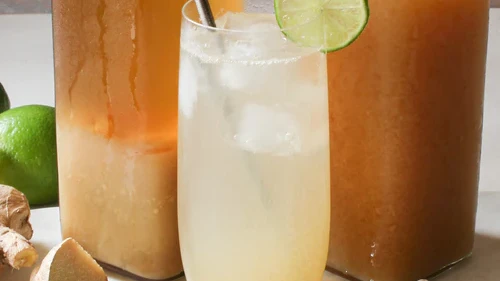Your Cart is Empty

Real old-fashioned homemade ginger ale recipe
Barb Hodgens
Barb Hodgens loves to cook with alternative, healthy whole food ingredients, with a focus on gut health. Barb has overcome her own gut health issues through healthy eating. Share your ideas, comments and photos at the end of this post :)

A thirst-quenching & nourishing drink.
You’ll love the refreshing quench of this naturally fermented ginger ale. It’s not the kind you're used to buying at the supermarket, there’s no artificial flavouring or preservatives – it’s the real old-fashion thing and it's super simple to make at home. Even though fermenting can feel intimidating, it really is easy to do. From start to finish you'll spend about ten minutes preparing it, the rest is up to nature.
Homemade ginger ale is a fantastic natural digestive and because it contains beneficial enzymes and probiotics it’s great for good gut health.
If you strain homemade yogurt, the yellowish liquid that drains away is whey. Whey is a wonderful ingredient containing strains of Lactobacillus bacteria that can saved and then used as a starter culture to make lacto-fermented drinks and lots of other delicious fruit and vegetable home ferments. Lacto-fermentation uses bacteria to preserve food naturally, but as a bonus, your digestion and overall well-being will benefit from consuming probiotic Lactobacillus bacteria.
Note: For a vegan option, the fermented coconut water drained from homemade coconut yogurt can be used in place of whey.

Don't be alarmed by the sugar in the ingredients. The sugar is food for the beneficial bacteria in the whey or fermented coconut water and is not included to make a sweet drink. The longer you let your ale ferment, the less sugar will be present in the final drink. You can decide how sweet you want it to be according to how long you leave the bacteria to work on the sugars.
The outcome depends on the strength of your starter culture, the temperature of your house, and the sugar used. Your final brew should have a good strong ginger bite and have a slight of yeast/fermentation smell. There may even have formed a bit of natural carbonation, so don't be alarmed if you see the mixture visibly churning in the bottom of the jar.
This recipe yields approx. 2 litres of concentrated ginger ale. The ginger and citrus pulp will settle at the bottom. Rotate the jar to incorporate before serving. Prepare it like a mixer or cordial. For a cool refreshing drink, pour a portion into a glass then add carbonated or still water and ice cubes. Ginger ale may also be enjoyed warm.

TROUBLE SHOOTING
- Use clean sterile glass jars.
- Watch carefully that your ale doesn't become too carbonated as this will cause too much pressure and may result in an exploding jar! In warmer weather you may need to open the jar to let off some CO2.
- Sugar alternatives such as honey, maple syrup or coconut sugar will not get probiotic results.
- Use the ingredients as a guide, you can increase the ginger or citrus as much as you want.
- The chlorine in tap water can kill the beneficial bacteria you are trying to encourage. Filtered or non-chlorinated water is recommended.



Real old-fashioned homemade ginger ale recipe
luvele
Rated 2.8 stars by 13 users
You’ll love the refreshing quench of this naturally fermented ginger ale. It’s not the kind you're used to buying at the supermarket, there’s no artificial flavouring or preservatives – it’s the real old-fashion thing and it's super simple to make at home.
Ingredients
- 3 thumbs of fresh ginger, roughly peeled and chopped
- 2 lemons peeled
- 1 lime peeled
- 1/3 cup of rapadura or brown sugar
- 2 teaspoons of salt
- 1/3 cup of whey from dripping homemade yogurt or coconut water from coconut yogurt
- 1 cup of filtered water (for blending)
- 2 litres of filtered water (approx.)
Directions
- Place the ginger, lemons, lime, sugar, salt, whey or coconut water and cup of water into the Vibe Blender jug.
Blend on ‘smoothie’ mode for 50 seconds or until the mixture resembles a fine smooth pulp.
Pour the ginger ale into sterile glass jars or bottles.
- Fill with filtered water. It is normal for the pulp to settle at the bottom of the jar.
Keep the jars at room temperature, away from direct sun light for 2 to 6 days. Use the season to guide how long you leave it. In cooler weather ferment for longer. In hot conditions the ginger ale will ferment quickly. 3 days is a good amount of time.
- Transfer to the fridge. Ginger ale will keep for several months in the fridge and actually gets better with time.
Shake it up before serving.
PIN THIS RECIPE


Real old-fashioned homemade ginger ale recipe

A thirst-quenching & nourishing drink.
You’ll love the refreshing quench of this naturally fermented ginger ale. It’s not the kind you're used to buying at the supermarket, there’s no artificial flavouring or preservatives – it’s the real old-fashion thing and it's super simple to make at home. Even though fermenting can feel intimidating, it really is easy to do. From start to finish you'll spend about ten minutes preparing it, the rest is up to nature.
Homemade ginger ale is a fantastic natural digestive and because it contains beneficial enzymes and probiotics it’s great for good gut health.
If you strain homemade yogurt, the yellowish liquid that drains away is whey. Whey is a wonderful ingredient containing strains of Lactobacillus bacteria that can saved and then used as a starter culture to make lacto-fermented drinks and lots of other delicious fruit and vegetable home ferments. Lacto-fermentation uses bacteria to preserve food naturally, but as a bonus, your digestion and overall well-being will benefit from consuming probiotic Lactobacillus bacteria.
Note: For a vegan option, the fermented coconut water drained from homemade coconut yogurt can be used in place of whey.

Don't be alarmed by the sugar in the ingredients. The sugar is food for the beneficial bacteria in the whey or fermented coconut water and is not included to make a sweet drink. The longer you let your ale ferment, the less sugar will be present in the final drink. You can decide how sweet you want it to be according to how long you leave the bacteria to work on the sugars.
The outcome depends on the strength of your starter culture, the temperature of your house, and the sugar used. Your final brew should have a good strong ginger bite and have a slight of yeast/fermentation smell. There may even have formed a bit of natural carbonation, so don't be alarmed if you see the mixture visibly churning in the bottom of the jar.
This recipe yields approx. 2 litres of concentrated ginger ale. The ginger and citrus pulp will settle at the bottom. Rotate the jar to incorporate before serving. Prepare it like a mixer or cordial. For a cool refreshing drink, pour a portion into a glass then add carbonated or still water and ice cubes. Ginger ale may also be enjoyed warm.

TROUBLE SHOOTING
- Use clean sterile glass jars.
- Watch carefully that your ale doesn't become too carbonated as this will cause too much pressure and may result in an exploding jar! In warmer weather you may need to open the jar to let off some CO2.
- Sugar alternatives such as honey, maple syrup or coconut sugar will not get probiotic results.
- Use the ingredients as a guide, you can increase the ginger or citrus as much as you want.
- The chlorine in tap water can kill the beneficial bacteria you are trying to encourage. Filtered or non-chlorinated water is recommended.


PIN THIS RECIPE


Subscribe
Sign up to get weekly healthy recipes & information on new product releases.
Item is added to cart


